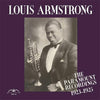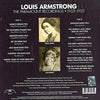



Louis Armstrong - The Paramount Recordings
COMPILATION
Louis Armstrong – Vocal, Trumpet [click here to see more vinyl featuring Louis Armstrong]
Ma Rainey (Gertrude Pridgett) – Vocal (A4-6)
Trixie Smith – Vocal (B1-3)
Coot Grant (B4-7)
Wesley Wilson (B4-7)
King Oliver's Creole Jazz Band (A1-3) : Albany Bigard, Albert Nicholas, Bert Cobb, Bill Johnson (4), Billy Paige, Bob Shoffner, Bud Scott, Buster Bailey, Charlie Jackson, Ed Atkins, Edward Ory, Honore Dutrey, Howard Scott, Jimmie Noone, Joe Oliver, Johnny Dodds, Johnny St. Cyr, Lil Hardin, Lil Hardin-Armstrong, Louis Armstrong, Luis Russell, Paul Barbarin, Richard M. Jones, Warren Dodds
Fletcher Henderson And His Orchestra (A7) : Albert Wynn, Arville Harris, Ben Webster, Benny Carter, Benny Morton, Bernard Addison, Billy Fowler, Bob Lessey, Bobby Stark, Budd Johnson, Buster Bailey, Charlie Dixon, Charlie Green, Clarence Holiday, Claude Jones, Coleman Hawkins, Del Thomas, Dick Vance, Dickie Wells, Don Pasquall, Don Redman, Ed Cuffee, Eddie Barefield, Edgar Campbell (3), Elmer Chambers, Elmer James, Elmer Williams, Emmett Berry, Ernest Elliott, Fernando Arbello, Fletcher Henderson, Franz Jackson, Fred Robinson, Freddy White, Harlan Lattimore, Harvey Boone, Henry "Red" Allen
1 LP, standard sleeve
Original analog Master tape : YES
Heavy Press : 180g
Record color : black
Speed : 33 RPM
Size : 12'’
Stereo
Studio
Record Press : Pallas
Label : ORG Music
Original Label : Paramount Records
Recorded 1923-1925
Released in 2018
Tracks:
Side A:
- Mabel's Dream (Take 1)
- The Southern Stomps (Take 2)
- Riverside Blues (Take 2)
- See See Rider (Take 1)
- Jelly Bean Blues (Take 2)
- Countin' The Blues (Take 3)
- Mandy, Make Up Your Mind (Take 2)
Side B:
- Railroad Blues (Take 1)
- The World's Jazz Crazy (And So Am I) (Take 2)
- Mining Camp Blues (Take 1)
- You Dirty Mistreater (Take 1)
- Come On Coot And Do That Thing (Take 2)
- Have Your Chill, I'll Be Here When Your Fever Rises (Take 2)
- Find Me At The Greasy Spoon (If You Miss Me Here) (Take 1)
Reviews:
“The recordings on this LP date from the last days of Louis Armstrong’s membership in the King Oliver Creole Jazz Band until the time when he left the Fletcher Henderson Orchestra to join his wife Lil Hardin’s Dreamland Syncopators, at which time also Armstrong’s famous Hot Five formed to record.
The first five tracks feature Armstrong playing second cornet with the Oliver band. Other than the two Takes of the Fletcher Henderson’s Orchestra playing Mandy Make Up Your Mind, the other tracks all have the same five-piece combo drawn from the Henderson Orchestra, led by Armstrong, accompanying the singers, Ma Rainey’s being called her Georgia Jazz Band, Trixie Smith’s her Down Home Syncopators, and Coot Grant and Wesley Wilson’s simply the Fletcher Henderson’s Orchestra, despite its consisting of only five pieces.
Of all the cuts on this LP, perhaps the first five will be most familiar. Mabel’s Dream and Riverside Blues are often given an outing by today’s traditional jazz bands, Southern Stomps a little less so. David Sager’s notes provide a useful analysis of each of the tracks, where he points out some special effects to listen for, often between a track and its alternate. As he says, speaking of Southern Stomps, a favorite of mine, one should listen to Oliver and Armstrong “engage in some of the harmonized breaks that drive the crowd wild at Lincoln gardens.” These breaks come through loud and clear, even though the original recording was acoustic, and I have heard good bands playing the Oliver arrangements elicit a similar response to the breaks today at festivals and club dates.
The five cuts with Ma Rainey feature three pieces and alternates. The first, See See Rider, and third, Countin’ the Blues, have alternate Takes with them; the other, Jelly Bean Blues, a lone Take. Even though the recording was acoustic, the power of Rainey’s voice is clear. Backing her would have been no mean feat, but Armstrong is up to the task, using mutes à la King Oliver and not competing with her, but supporting her with obbligatos and answering phrases at the ends of some strains. On all five tracks he uses mutes; only in the four-measure turnaround at end of See See Rider does he remove the mute and play open horn.
Trixie Smith, whose tracks follow Ma Rainey’s, was not related to Bessie Smith, and she is not as well-known among blues aficionados, perhaps, as Rainey and Bessie Smith are. Unlike them, Trixie Smith was born into the black middle class, and she paid her dues in vaudeville and minstrel shows, as well as performing as a dancer, a comedian, an actress, and a singer. Her voice lacks the strength of Rainey’s which had a touch of coarseness and a plaintive quality, and while she utilizes vibrato, it is not throbbing, like that of Rainey. But in its way it is still definitive—even with a certain smoothness, she delivers blues that are convincing, that one can believe.
An exception to that might be her first track, You’ve Got to Beat Me to Keep Me, one that certainly would attract hordes of protesters today. She may well have had tongue-in-cheek inviting all the violence on her person, however, and this song could be a holdover from her vaudeville days. Once again Armstrong backs her with muted horn, giving a response, whether solo or leading the ensemble, to each phrase that she, as caller, utters, witness Mining Camp Blues or Railroad Blues.
The final vocals are delivered by a duo, Coot Grant and Wesley Wilson. Rather than blues singers, I would be more inclined classify them as a vaudeville act, given their treatment of the songs. These are half sung/half talked, occasionally backed with stop chords. The songs are interspersed with badinage aimed to amuse. It is all quite entertaining, but not quite the blues for me. Although well in the background, Armstrong plays both melody and response by turns, backing the vocals on these last cuts, as well as coming forward to lead the ensemble on occasion between vocal strains.” Bert Thompson, The Syncopated Times, May 1, 2020
Ratings :
Discogs : 3,5 / 5


